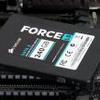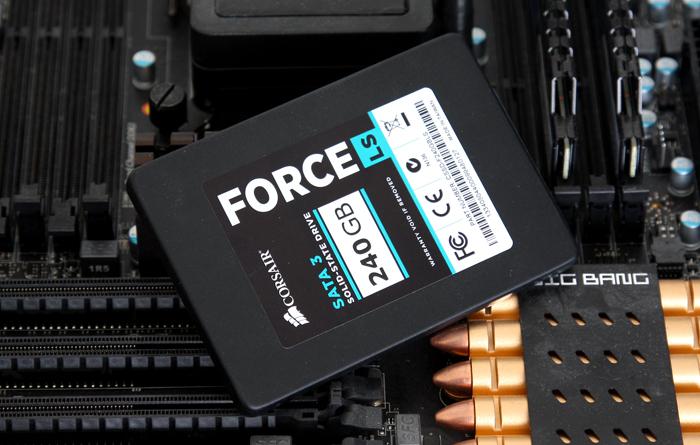Final Words & Conclusion
Final Words & Conclusion
The Force LS series is interesting in many ways. It is an affordable SSD series, it's isn't slow, it isn't the fastest SSD on the block either. However the Phison controller used in combo with the 19nm toggle NAND did surprise me as the package combined results in a SSD that can keep up very well with LSI and Marvell based products. We've seen no oddities and overall the SSD is performing pretty nice.
The Force LS kicks ass at sustained and linear read/writes. It won't set any records in IOPs performance though you sometimes need to wonder why on earth you'd need 80K+ IOPs/sec in a normal PC anyway. We however don't know much about the controller and can't say how reliable it really is. But I have no doubts it'll be fine. based on the specs BTW the drive will last you roughly 10 years if you write 10 GB per day / 365 a year on it.
Performance
If you put a drive like this into your SATA3 compatible laptop or PC, you'll have no idea what is about to hit you. We very much enjoy the grand sustained and linear write performance of this SSD series. Overall this SSD shines at many factors and in many levels, IOPS performance is a notch down though, IOPS is not something you as a consumer should worry about too much unless you are doing a lot of database related or create similar workloads on your PC, but this SSD certainly is ranking high within this aspect. Trace testing we think is by far the best test in our entire benchmark suite is PCMark Vantage 64-bit. This is a trace test and can emulate what you guys do on your PC but then multiplied with factor 100. Trace testing was a bit more average, but overall still pretty nice. Sustained read write performance, again excellent. Especially read performance leads and is top ranking.
Overall SSD Usage
As stated we very much enjoy the grand overall performance of this SSD series, so when you copy a fast amount of compressed data, then the SSD will perform seriously fast in performance. Make no mistake, replacing a HDD with an SSD in your desktop PC or laptop eliminates the random access lag of the HDD head, it is no longer mechanical. That combined with the performance SATA3 offers these days is simply a massive difference and probably the best upgrade you can make for your computer anno 2013.
SATA Controllers
Some overall recommendations then. Should you be in the market for a SATA3 SSD then we have a couple of hints. First and foremost if you have a SATA2 controller only on your motherboard, then you'll get limited at roughly 270 MB/sec read and writes. SATA3 (6Gbps) will free you up from that allowing the SSD to perform in the 500 MB/sec range. It however is important that you connect your SSD towards the proper controller. We absolutely prefer the performance of the Intel Series 6 and 7 (H67/P67/Z68/Z77/H77/X79/Z87) integrated SATA 6G controller over anything else available in the market. If you run the SSD from a 3rd party controller with say a Marvell 6G controller, you will see lower performance. The new AMD 85X chipsets also offer fantastic performance. The more recent Asmedia controllers we spotted lately on motherboards are also offering good performance, albeit still 20% - 25% slower then Intel's controllers. Also make sure you run your drive in AHCI mode, it does make such a difference in performance... really guys, a big difference.
Price, HDD VS SSD
First a generic rule that I always apply; you should probably stop looking at the Solid State Disk technology as if it were a traditional HDD. We all will be old and grey before the two reach the same prices or top the multiple TB volume storage the HDD offers for less money. Comparing an SSD with an HDD is making a comparison in-between an integrated IGP or a dedicated graphics card, that last one will cost you a heck of a lot more yet you gain incredible overall performance. It is the very same with an SSD, use it as boot drive on Windows and applications and you instantly have removed a huge bottleneck, namely load and access times. It is a difference in-between night and day (in a proper system). For massive storage like movies, MP3 files and bulky data you do not access on a regular basis, sure that's where the HDD remains the winner as a cheaper storage solution. Guru3D's rule of thumb; the magic simply is finding a good combination in-between the two and balance things out. Use a nice 240GB SSD for your operating system and applications, and park these movies and MP3 files onto a separate TB HDD. That's where the magic happens. I kid you not, all my test systems and work systems run on SSDs, not once have I considered going back to HDDs. The benefits of a good SSD are simply grand. But that doesn't mean I do not understand the budget and cost dilemma that many of you are facing though.
Pricing
As mentioned on page two of this review, we looked up the numbers from some online etailers. Currently several drives are available for purchase in the USA and EU, though stock in the USA seems limited at the moment of writing. You may expect 60 GB, 120 GB and 240 GB to cost respectively of $70 / €60, $110 / €99, and $200 / €175. These are rough MSRP prices and as you can see they are reasonable. You'll receive a three year carry-in warranty with this drive, which we feel is an acceptable warranty policy.
Concluding
The Corsair Force LS SSD series positions itself in a massively saturated market. The model as tested today is a good performing product, not a top performing one though. The overall read performance is good, the trace tests a tiny hint average though realistically not something you'd ever notice. But the sustained reads and writes are exceptional. If IOPS matter to you you might want to look elsewhere, as its good but not perfect but again pleeeeeeenty fast enough. At a price of roughly 175 EUR for a 240 GB model we'll have to see how popular the Force LS series really will become, but money wise these are darn interesting alright. Corsair will cover this product with a three year warranty. We can certainly recommend the Force LS series, it is lovely in terms of storage performance, plenty fast for today's modern age PC and as such comes very much recommended.
- Sign up to receive a notice when we publish a new article
- Or go back to Guru3D's front page



